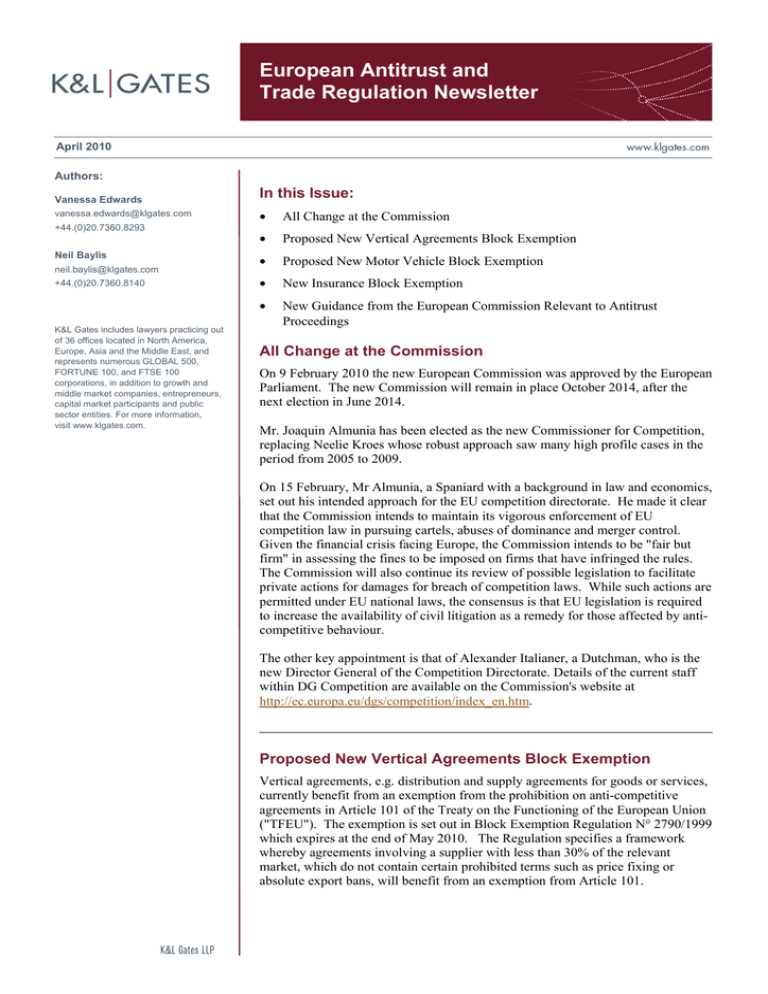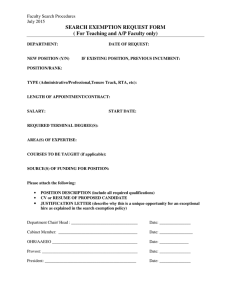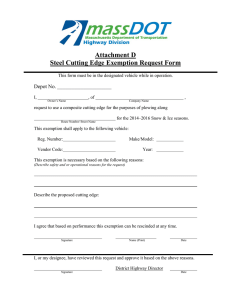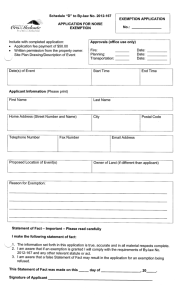European Antitrust and Trade Regulation Newsletter In this Issue:
advertisement

European Antitrust and Trade Regulation Newsletter April 2010 Authors: Vanessa Edwards vanessa.edwards@klgates.com +44.(0)20.7360.8293 Neil Baylis neil.baylis@klgates.com +44.(0)20.7360.8140 K&L Gates includes lawyers practicing out of 36 offices located in North America, Europe, Asia and the Middle East, and represents numerous GLOBAL 500, FORTUNE 100, and FTSE 100 corporations, in addition to growth and middle market companies, entrepreneurs, capital market participants and public sector entities. For more information, visit www.klgates.com. In this Issue: • All Change at the Commission • Proposed New Vertical Agreements Block Exemption • Proposed New Motor Vehicle Block Exemption • New Insurance Block Exemption • New Guidance from the European Commission Relevant to Antitrust Proceedings All Change at the Commission On 9 February 2010 the new European Commission was approved by the European Parliament. The new Commission will remain in place October 2014, after the next election in June 2014. Mr. Joaquin Almunia has been elected as the new Commissioner for Competition, replacing Neelie Kroes whose robust approach saw many high profile cases in the period from 2005 to 2009. On 15 February, Mr Almunia, a Spaniard with a background in law and economics, set out his intended approach for the EU competition directorate. He made it clear that the Commission intends to maintain its vigorous enforcement of EU competition law in pursuing cartels, abuses of dominance and merger control. Given the financial crisis facing Europe, the Commission intends to be "fair but firm" in assessing the fines to be imposed on firms that have infringed the rules. The Commission will also continue its review of possible legislation to facilitate private actions for damages for breach of competition laws. While such actions are permitted under EU national laws, the consensus is that EU legislation is required to increase the availability of civil litigation as a remedy for those affected by anticompetitive behaviour. The other key appointment is that of Alexander Italianer, a Dutchman, who is the new Director General of the Competition Directorate. Details of the current staff within DG Competition are available on the Commission's website at http://ec.europa.eu/dgs/competition/index_en.htm. Proposed New Vertical Agreements Block Exemption Vertical agreements, e.g. distribution and supply agreements for goods or services, currently benefit from an exemption from the prohibition on anti-competitive agreements in Article 101 of the Treaty on the Functioning of the European Union ("TFEU"). The exemption is set out in Block Exemption Regulation N° 2790/1999 which expires at the end of May 2010. The Regulation specifies a framework whereby agreements involving a supplier with less than 30% of the relevant market, which do not contain certain prohibited terms such as price fixing or absolute export bans, will benefit from an exemption from Article 101. European Antitrust and Trade Regulation Newsletter The Commission has spent the last two years assessing the relevance and application of the Regulation, based on experience and feedback from companies, advisers and other affected parties and has found that the current rules have worked well in practice. well as the supply of spare parts and information. The Commission's general strategy is to seek to remove sector specific block exemptions as markets become more competitive. This is reflected in the proposed new Motor Vehicle Block Exemption. At the time of its adoption in 1999, the Regulation aimed at considerably reducing the regulatory burden on companies, in particular for companies with no market power which, as noted above, was deemed for the purposes of the Regulation to be a market share of less than 30%. Under the draft revised Motor Vehicle Block Exemption, the Commission proposes to prolong the application of the existing Block Exemption until 31 May 2013 to contracts for the purchase, sale or resale of new motor vehicles. From 1 June 2013, the new Vertical Agreements Block Exemption will apply to those agreements. Two major developments have marked the tenyear period following the entry into force of the Regulation: a further increase in large distributors' market power and sales on the Internet. Vertical agreements relating to the purchase, sale or resale of spare parts for motor vehicles or repair and maintenance services for motor vehicles (the aftermarket) will be subject immediately to the new Vertical Agreements Block Exemption (including its list of hardcore restrictions). In order to benefit from an exemption, such agreements must also not contain any of the hardcore clauses listed in the draft revised Motor Vehicles Block Exemption. To take account of these developments, the Commission proposes that for a vertical agreement to benefit from the Block Exemption, not only the supplier's market share (as is currently the case) but also the buyer's market share should not exceed 30%. This will be likely to take a number of agreements outside the Block Exemption and will require those agreement to be carefully assessed for compliance with Article 101. The new Block Exemption will also clarify that every distributor must be free to use the Internet to advertise or to sell products. A restriction on the use of the Internet will only be compatible with the Block Exemption to the extent that promotion on the Internet or sales over the Internet would lead to active selling into other distributors' exclusive territories or customer groups. In general, however, the use of the Internet is not considered to be a form of active selling into such territories or customer groups. If a customer outside the allotted territory visits the web site of a distributor and contacts the distributor and if such contact leads to a sale, including delivery, then that is considered passive selling. Proposed New Motor Vehicle Block Exemption At the same time as reviewing the Vertical Agreements Block Exemption, the Commission is also consulting on a new Motor Vehicle Block Exemption which deals specifically with the purchase, sale or resale of new motor vehicles as These are: • a restriction on the sale of spare parts for motor vehicles by members of a selective distribution system to independent repairers which use these parts for the repair and maintenance of a motor vehicle; • a restriction, agreed between a supplier of spare parts, repair tools or diagnostic or other equipment and a manufacturer of motor vehicles, of the supplier's ability to sell these goods or services to authorised or independent distributors or to authorised or independent repairers or end users; • a restriction, agreed between a manufacturer of motor vehicles which uses components for the initial assembly of motor vehicles and the supplier of such components, of the latter's ability to place its trade mark or logo effectively and in an easily visible manner on the components supplied or on spare parts. The Commission will monitor the operation of the new regulation, drawing up a report on its operation by 31 May 2018. The new Motor Vehicle Block Exemption will expire on 31 May 2020. April 2010 2 European Antitrust and Trade Regulation Newsletter New Insurance Block Exemption On 1 April 2010 the new EU Block Exemption for the insurance sector comes into force. As part of the general trend away from widely drafted exemptions for particular sectors, the new Block Exemption is now limited to exempting the following arrangements from the prohibition in Article 101 TFEU: • the joint compilation and distribution of information necessary for the: o calculation of the average cost of covering a specified risk in the past; o construction of mortality, illness, accident and invalidity tables. The exemption is subject to a number of provisos including that the tables or studies do not identify specific insurance companies or the level of any premiums. • the setting up and operation of pools of insurance or re-insurance for the common coverage of a specific category or risks in the form of co-insurance or co-reinsurance. Such pools are only exempted: o where the pool is to last for three years or less; o where the market share of the participants is less than 20% of the relevant market for co-insurance pools and 25% for co reinsurance pools; o where the agreement does not limit output or sales, allocate markets or customers or allow for premiums to be agreed. The new Block Exemption will expire on 31 March 2017. New Guidance from the European Commission Relevant to Antitrust Proceedings The European Commission’s Directorate-General for Competition had a busy time in the last few weeks of former Commissioner Neelie Kroes’s tenure. Among other things, DG Comp published an external Study on the quantification of harm suffered by victims of competition law infringement together with three explanatory documents concerning how EU antitrust procedures work in practice. The Study on the quantification of harm is the result of a study commissioned from a group of economic consultants and lawyers as part of DG Comp’s recent initiatives on damages actions for breach of EU antitrust rules, which have included a 2008 White Paper and the ill-fated draft Directive which was withdrawn in October 2009 [link to previous edition of newsletter]. It now seems from a recent speech by John Dalli, the new EU consumer commissioner, that the Commission plans to carry out a fresh consultation on the proposals later this year, so legislation is unlikely to be adopted for some time to come. The Study notes that one of the widely recognised obstacles to such damages actions is the quantification of damages and seeks to assist the Commission in developing non-binding guidance for the benefit of national courts and for the parties. The study considers the conceptual framework for damages estimation (determining the counterfactual scenario for hardcore cartel agreements and exclusionary conduct and moving from the counterfactual stage to a final damages value), methods and models for quantifying damages (comparator based approaches, financial-analysis-based approaches, market-structure-based approaches) and further insights from economics and finance into the existence and possible magnitude of cartel overcharges and pass-on of overcharges. The conclusion, “Arriving at a final damages value”, notes that a range of methods and models can in principle be used for estimating the various types of damage that might result from antitrust infringements, with the choice of approach (or approaches) depending on the details of each case. The primary focus in any given case would normally be on whether specific methods or models have been applied reasonably and robustly to the case at hand, so that the court can identify a preferred model or “pool” a selection of model results to arrive at a final damages value. The Study was finalised in December 2009 and followed in January 2010 by a workshop of external economic experts to discuss a range of issues concerning the quantification of harm in damages actions for antitrust infringements, also organised by DG Comp. (See also the first article of this newsletter). April 2010 3 European Antitrust and Trade Regulation Newsletter On 6 January 2010 the European Commission published three documents entitled Best Practices on the conduct of proceedings concerning Articles 101 and 102 TFEU [formerly Articles 81 and 82 of the EC Treaty], Best Practices for the submission of economic evidence and data collection in cases concerning the application of Articles 101 and 102 TFEU and in merger cases and Guidance on procedures of the Hearing Officers in proceedings relating to Articles 101 and 102 TFEU. The documents are intended to make it easier for companies under investigation to understand how the investigation will proceed, what they can expect from the Commission and what the Commission will expect from them. The documents may be amended in the light of comments received from stakeholders, but will apply in their published form to procedures ongoing at the time of publication. Best Practices on the conduct of antitrust proceedings This paper covers the procedure followed during the investigative phase, whether it leads to a prohibition decision, a commitment decision or a rejection of complaint; the main procedural steps and rights of defence in the context of procedures leading to prohibition decisions; the specificities of the commitment procedure; rejection of complaints; the limits to use of information; and the adoption, notification and publication of decisions. The aim of the document is to further improve procedures by enhancing transparency while at the same time ensuring the efficiency of the Commission's investigations. Important areas where the Commission will be amending its procedures include: • earlier opening of formal proceedings, as soon as the initial assessment phase has been concluded; offering state of play meetings to the parties at key points of the proceedings; • disclosing key submissions, including giving early access to the complaint, so that parties can express their views in the investigative phase; • publicly announcing the opening and closure of procedures, as well as when Statement Objections have been sent; • providing guidance on how the new instrument of commitment procedures is used in practice. The Best Practices do not apply to the settlement and leniency procedures which may be used in cartel cases, and certain provisions in the Best Practices guidance (such as that concerning the state of play meetings) do not generally apply to cartel investigations. Best Practices on submission of economic evidence in antitrust cases This document formulates best practices concerning the generation and presentation of relevant economic and empirical evidence that may be taken into account in the assessment of a competition case. It also explains the practice of the competition department's case teams and the Chief Economist when interacting with parties which submit economic evidence. The paper is in two main sections. The first section provides recommendations regarding the content and presentation of economic or econometric analysis in order to facilitate its assessment and the replication of any empirical results by DG Comp and/or the other parties. It covers formulating the relevant question; data relevance and reliability; choice of empirical methodology; reporting and interpreting the results; and robustness. The second section provides guidance to respond to Commission requests for quantitative data to ensure that timely and relevant input for the investigation can be provided. It covers general motivation for, and common elements of, data requests and the main criteria to consider when responding to a data request. The paper concludes with a helpful Annex showing the structure and basic elements of a sound empirical submission. Guidance on procedures of the Hearing Officers in antitrust proceedings The Commission created the post of Hearing Officer in 1982 to ensure that the effective exercise of the right to be heard is respected in competition proceedings before the Commission. Hearing Officers, of whom there are currently two, are independent of DG Comp (although they are attached to the Competition Commissioner for administrative convenience and may be Commission officials). The aim of the Guidance is to make their role more transparent. April 2010 4 European Antitrust and Trade Regulation Newsletter The Paper sets out the various tasks of the Hearing Officers as established in their mandates and outlines how these tasks are usually carried out in the different phases of an antitrust case, including the investigative phase; access to the file; disclosure of confidential information; deadlines to reply to the Statement of Objections; admission of third parties to the procedure; the oral hearing; rejection of complaint; and commitment decisions. The Paper thus provides companies subject to investigations, complainants and other third parties with a manual of when they can turn to the Hearing Officers to ensure due process is ensured. Finally, the Paper explains the reporting obligations and the advisory role of Hearing Officers towards the Competition Commissioner, the College of Commissioners and the addressees of Commission decisions. Anchorage Austin Beijing Berlin Boston Charlotte Chicago Dallas Dubai Fort Worth Frankfurt Harrisburg Hong Kong London Los Angeles Miami Moscow Newark New York Orange County Palo Alto Paris Pittsburgh Portland Raleigh Research Triangle Park San Diego San Francisco Seattle Shanghai Singapore Spokane/Coeur d’Alene Taipei Tokyo Warsaw Washington, D.C. K&L Gates includes lawyers practicing out of 36 offices located in North America, Europe, Asia and the Middle East, and represents numerous GLOBAL 500, FORTUNE 100, and FTSE 100 corporations, in addition to growth and middle market companies, entrepreneurs, capital market participants and public sector entities. For more information, visit www.klgates.com. K&L Gates is comprised of multiple affiliated entities: a limited liability partnership with the full name K&L Gates LLP qualified in Delaware and maintaining offices throughout the United States, in Berlin and Frankfurt, Germany, in Beijing (K&L Gates LLP Beijing Representative Office), in Dubai, U.A.E., in Shanghai (K&L Gates LLP Shanghai Representative Office), in Tokyo, and in Singapore; a limited liability partnership (also named K&L Gates LLP) incorporated in England and maintaining offices in London and Paris; a Taiwan general partnership (K&L Gates) maintaining an office in Taipei; a Hong Kong general partnership (K&L Gates, Solicitors) maintaining an office in Hong Kong; a Polish limited partnership (K&L Gates Jamka sp. k.) maintaining an office in Warsaw; and a Delaware limited liability company (K&L Gates Holdings, LLC) maintaining an office in Moscow. K&L Gates maintains appropriate registrations in the jurisdictions in which its offices are located. A list of the partners or members in each entity is available for inspection at any K&L Gates office. This publication is for informational purposes and does not contain or convey legal advice. The information herein should not be used or relied upon in regard to any particular facts or circumstances without first consulting a lawyer. ©2010 K&L Gates LLP. All Rights Reserved. April 2010 5




